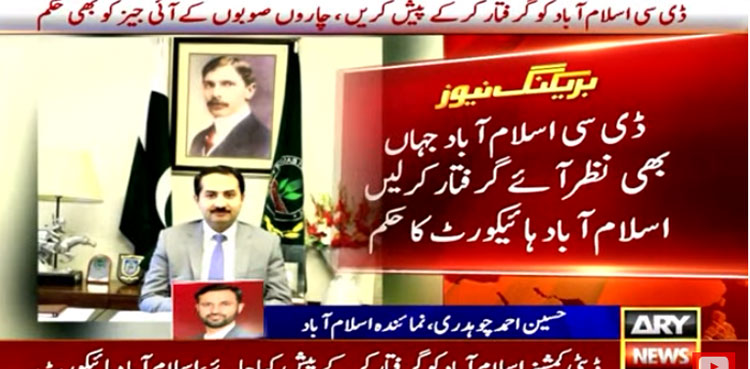The Islamabad High Court issued arrest warrants for Islamabad Deputy Commissioner Irfan Nawaz Memon in a contempt case. The court also ordered IGPs to arrest and produce the deputy commissioner. Additionally, the court indicted several officials, including PTI leader Shehryar Afridi, under the MPO Ordinance, 1960.

ISLAMABAD: The Islamabad High Court (IHC) on Tuesday issued arrest warrants for Islamabad Deputy Commissioner Irfan Nawaz Memon in the contempt case.
The high court has ordered IGPs of all the four provinces and Islamabad to arrest the deputy commissioner and produced before it in the case.
Justice Babar Sattar had indicted Senior Superintendent of Police (SSP) operations Jamil Zafar, Superintendent (SP) Farooq Buttar and Station House Officer (SHO) Nasir Manzoor while presiding over the hearing of the case.
The IHC had earlier suspended PTI leader Shehryar Afridi’s arrest warrants under maintenance of public order (MPO) and ordered his immediate release.
Afridi was first arrested on May 16 from his Islamabad residence under Section 3 of the MPO Ordinance, 1960. He was rearrested on May 30 under the same section soon after his release from prison.
The court also indicted capital Deputy Commissioner (DC) Irfan Nawaz Memon and three others for contempt in Afridi’s case.
DC Memon and SSP Zafar pleaded not guilty to the charges and also apologised unconditionally to the court. The court also indicted SP Farooq Buttar and SHO Naseer Manzoor with contempt of court, however, both denied the charges.
In a recent development, the Islamabad High Court (IHC) has issued an arrest warrant for the Deputy Commissioner (DC) of Islamabad, marking a significant turn of events in the legal and administrative landscape. This decision has sparked discussions and raised questions about the powers of the judiciary in regulating administrative officials.
The issuance of an arrest warrant for a high-ranking administrative officer brings to the forefront the intricate balance of power and responsibility between the judiciary and the executive branch of government. It is imperative to delve into the legal nuances and implications of such a decision in order to comprehend its significance.
The IHC’s action underscores the crucial role of the judiciary as a check and balance on the powers of administrative officials. This development prompts a critical examination of the legal framework that governs the conduct and accountability of public officials, especially in the realm of administrative law.
Furthermore, this case presents an opportunity to explore the intersection of judicial discretion and the rule of law. It invites us to consider the principles that guide the judiciary in exercising its authority while upholding the principles of justice and fairness.
As this legal saga unfolds, it is essential for stakeholders and the general public to gain a comprehensive understanding of the legal intricacies at play. This case serves as a timely reminder of the significance of transparent and accountable governance, and the pivotal role of the judiciary in ensuring the upholding of the law.
The evolving nature of this development calls for a close examination of the legal underpinnings and the potential ramifications for the administration and the judiciary. It is a testament to the enduring relevance of law and legal institutions in shaping the governance and accountability of public officials.
Source: ARY NEWS
Disclaimer:
This content is AI-generated using IFTTT AI Content Creator. While we strive for accuracy, it’s a tool for rapid updates. We’re committed to filtering information, not reproducing or endorsing misinformation. – Khabristan.pk for more information visit privacy policy








Leave a Comment